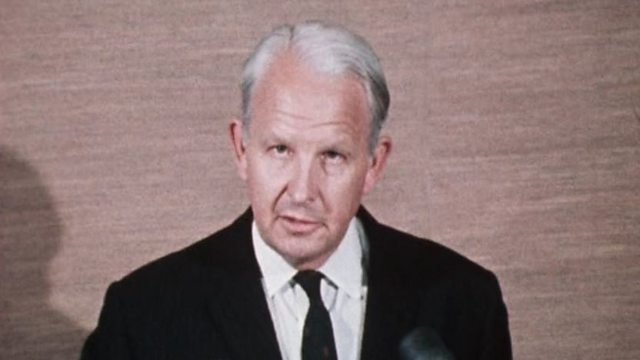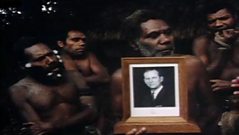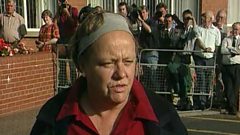
Prime Minister Brian Faulkner criticises Taoiseach Jack Lynch
Northern Ireland’s Prime Minister Brian Faulkner denounces Taoiseach Jack Lynch’s call for the abolition of the Stormont parliament.
: Reading from a prepared statement the Unionist Prime Minister of Northern Ireland, Brian Faulkner, responds to the Republic of Ireland’s Fianna Fáil Taoiseach’s call for the abolition of the Stormont parliament. Four days previously Faulkner had introduced internment without trial which targeted primarily Northern Ireland’s nationalist community. (See context below) Responding to Taoiseach Jack Lynch’s subsequent call for the Stormont parliament to be abolished, Faulkner defends his government’s response to civil rights demands and promises to publish a White Paper to detail the legislation that has been introduced to bring about constructive change. He refers to his offer of 22 June 1971 that he would set up a new Stormont committee system which would allow nationalist politicians to chair some important committees.
He accuses the Irish premier of hypocrisy in his dealings with the IRA who are slaughtering Ulster men and women whom Lynch claims to be his fellow citizens.
Context:
In the early hours of Monday morning, 9 August 1971, the Army and police set off in a widespread series of arrest operations in towns around Northern Ireland. During the first morning of ‘Operation Demetrius’, 342 people were arrested; just over a hundred of them were released two days later. The detainees were imprisoned in Crumlin Road Prison and on the Maidstone, a soldiers’ billet turned into a prison ship, at Belfast docks.
The Prime Minister, Brian Faulkner, had been facing mounting criticism of his security policies from within his own party, and felt that his only option was to introduce internment without trial to counteract IRA attacks. It was a tactic that he had used successfully against the IRA during the late 1950s; but in 1971, it proved a serious security and political blunder. This time the security forces were operating on out-dated RUC intelligence. In addition, internment intensified the violence. In the three days following the introduction of internment 25 people were killed, the majority shot by the Army. The Parachute Regiment was responsible for 11 deaths in the Springfield area in Belfast alone, including Father Hugh Mullan, shot while administering the last rites to an injured man and Joan Connolly a mother of eight; about 240 houses in Ardoyne were destroyed by fire; a member of the UDR was shot dead in Co Tyrone; and Londonderry experienced protracted rioting as more than 30 barricades were put up in the Creggan and the Bogside.
Most of the new leadership of the IRA escaped the army raids, and – with the exception of two Protestant civil rights activists, Ronnie Bunting and John McGuffin – the measure was used exclusively against the Catholic community. The fact that no loyalists were arrested increased the Catholic community’s sense of grievance. Subsequent allegations of torture against the people arrested led to an upsurge in recruitment to the IRA and an increase in sympathy and finance for the IRA at home and abroad, particularly from some among the substantial Irish-American community in the United States.
Up to 9 August, 34 people had died in the violence that year. Only three days after the introduction of internment, 25 more people had been killed. Among the dead was Winston Donnell, the first member of the Ulster Defence Regiment to be killed. Thousands of people had been forced to leave their homes in Belfast because of sectarian attacks and many Belfast Catholics left the city for refugee camps across the border.
In the first six months of internment, nearly 2,400 people were arrested; of these 1,600 were released after interrogation. The Army admitted years later that internment was a major mistake.
Duration:
This clip is from
More clips from �鶹������ҳ��� Nine O'Clock News
-
![]()
Worshipped in Vanuatu—24/06/1980
Duration: 01:02
-
![]()
Real IRA statement on Omagh bomb—18/08/1998
Duration: 02:39
-
![]()
Van Gogh Painting Auctioned for Record £25 million—30/03/1987
Duration: 02:41
-
![]()
Analysis of the 1997 Election—02/05/1997
Duration: 02:45





